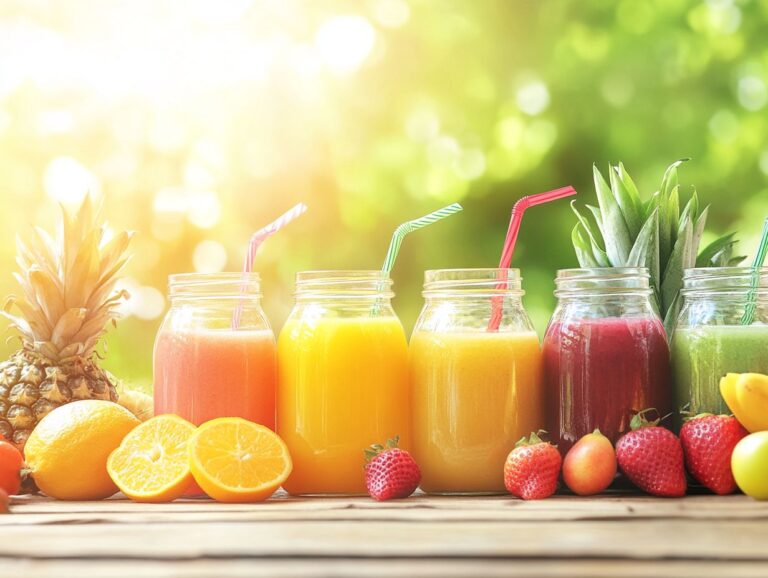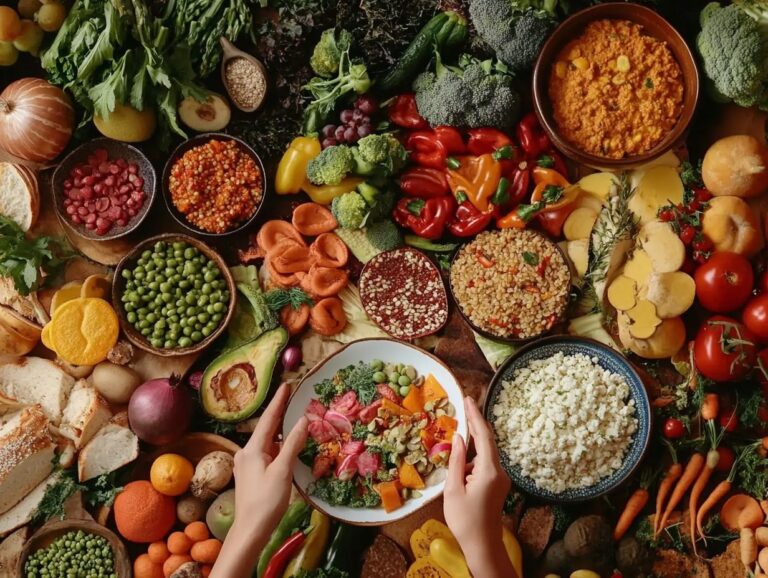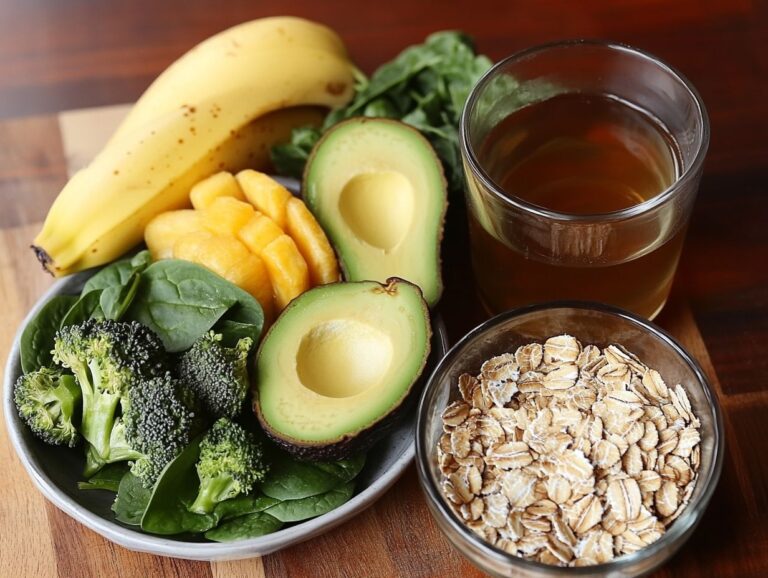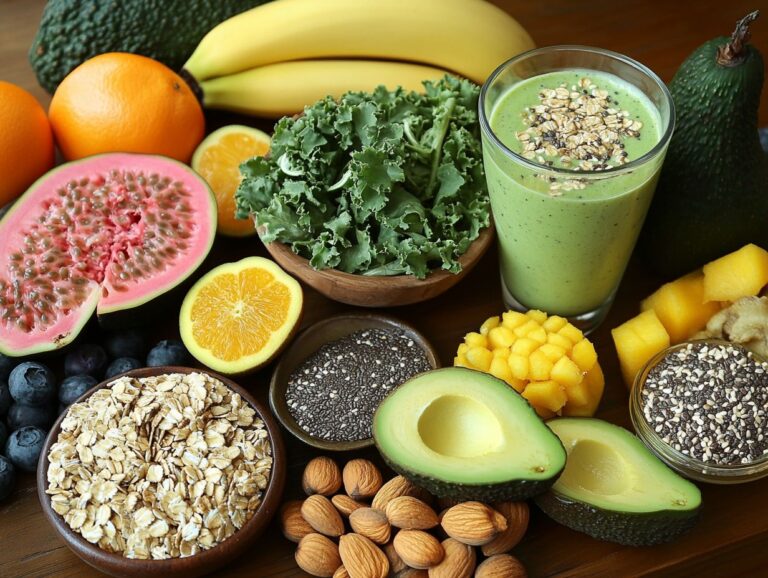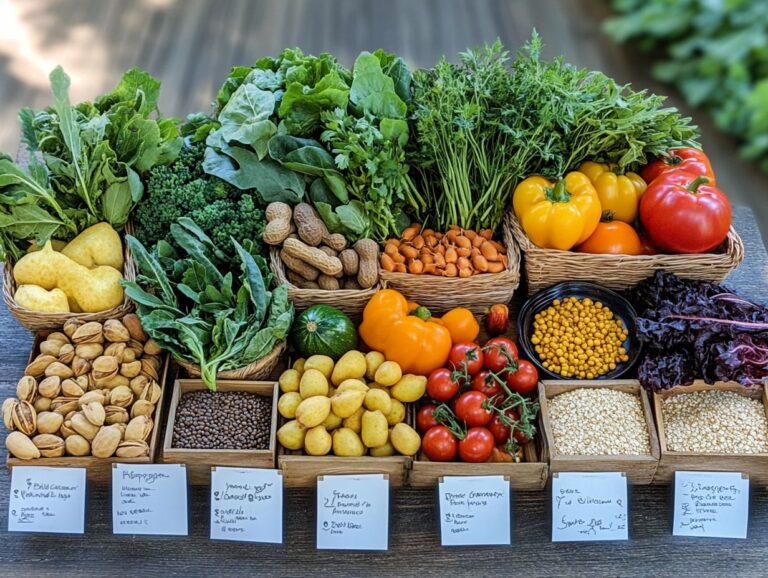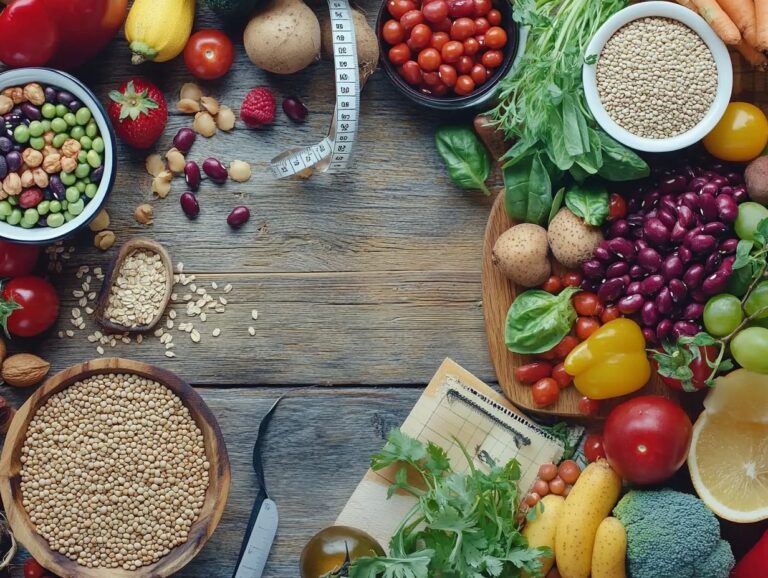Breastfeeding can be a rewarding yet challenging experience, particularly for vegan mothers who want to ensure both they and their babies receive the proper nutrition. This article explores the essentials of a vegan breastfeeding diet, highlighting the key nutrients necessary for breastfeeding mothers and offering tips for creating balanced meals. Additionally, we discuss how this dietary approach can impact milk production and the overall health of the baby.
What Is a Vegan Breastfeeding Diet?
A vegan breastfeeding diet is a lifestyle choice that supports lactating mothers by providing essential nutrients for both maternal health and proper breast milk production. This approach ensures that breastfeeding moms meet their nutritional needs, including adequate protein and calcium-rich foods, without relying on animal products.
This diet includes a variety of plant-based foods, such as protein-rich foods and calcium-rich options, that ensure breastfeeding moms receive adequate protein and essential vitamins without the need for animal products. Omega-3 fatty acids and vitamin B12 are also crucial components of this diet.
Why Is Nutrition Important for Breastfeeding Moms?
Nutrition is essential for breastfeeding mothers, as it impacts their health and the quality of breast milk, which is crucial for infant nutrition.
A balanced diet plays a key role in managing breastfeeding weight loss, ensuring proper hydration, and enhancing the overall breastfeeding experience. It also supports infant nutrition by providing essential nutrients through breast milk.
Additionally, good nutrition can help reduce the risk of postpartum depression and improve iron absorption, which in turn can decrease maternal anemia and promote better health for infants. A health care provider can offer guidance on dietary supplements if needed.
What Nutrients are Essential for Breastfeeding Moms?
Breastfeeding mothers have unique nutritional requirements that necessitate a balanced intake of nutrients to promote their health and that of their developing infants. To meet these needs, it is important to include various whole foods in their diets.
- Omega-3 fatty acids, primarily found in plant-based sources like flaxseeds and walnuts, are crucial for brain development in infants and may also help regulate the mother’s mood.
- Calcium can be obtained from green leafy vegetables, fortified plant-based milks, and other calcium-rich foods, ensuring strong bones and teeth for both mother and child.
- Vitamin B12, found in fortified foods or through dietary supplements, is vital for energy production and maintaining a healthy nervous system.
- Adequate protein intake, sourced from legumes, nuts, and lean meats, supports tissue repair and milk production.
- Additionally, iron-rich foods such as spinach and lentils, along with vitamin C for better iron absorption, are essential for combating postpartum fatigue and promoting overall health.
How to Create a Balanced Vegan Breastfeeding Diet?
A balanced vegan breastfeeding diet consists of a variety of healthy meals and snacks that meet the unique nutritional needs of lactating mothers while ensuring the quality of breast milk for infants.
This can be accomplished by choosing a diverse range of nutrient-dense foods rich in protein, calcium, and omega-3 fatty acids.
By adhering to a plant-based nutrition philosophy and prioritizing whole foods over processed options, breastfeeding mothers can establish a nutritious vegan diet that supports their health and enhances the benefits of breastfeeding, including reducing the risk of SIDS (Sudden Infant Death Syndrome).
What Foods Should Be Included in a Vegan Breastfeeding Diet?
A vegan breastfeeding diet should include a wide variety of food options that provide essential nutrients for both mothers and their nursing infants. A balanced and diverse vegan diet is crucial for meeting the increased nutritional demands of lactation and enhancing the quality of breast milk, which directly influences the health and development of the baby.
For instance, legumes such as chickpeas and black beans offer both protein and vital vitamins and minerals. Additionally, snacks like almond butter on whole-grain bread are a delicious way to boost calcium intake.
Omega-3 fatty acids, which are important for brain development, can be obtained by frequently incorporating walnuts and algae oil into meals. By providing a diverse diet rich in these food categories, vegan breastfeeding mothers can meet their nutritional needs while promoting optimal growth for their children.
What Foods Should Be Limited or Avoided in a Vegan Breastfeeding Diet?
A vegan breastfeeding diet can be both healthy and nutritious; however, certain foods should be restricted or avoided to ensure the best outcomes for both mothers and infants.
Highly processed foods, added sugars, caffeine, and foods that may inhibit iron absorption—such as those high in phytates—can be detrimental to maternal health and the quality of breast milk. Limiting these foods may help prevent the development of postpartum depression and other nutritional deficiencies that can arise during lactation.
Mothers should be particularly cautious with legumes and whole grains. While these foods are healthy, they contain compounds that can block iron absorption when consumed in excess. Although a nutrient-rich diet is essential for both mother and child, too much of these foods may lead to lower iron levels in the mother, potentially affecting the baby.
It is advisable to avoid certain nutrient-poor, high-fat processed snacks, as these can limit the essential nutrients needed for the production of high-quality breast milk.
Finding a balanced approach that emphasizes whole foods rich in vitamins and minerals is crucial for promoting maternal health and enhancing the overall breastfeeding experience.
Are There Any Supplements Needed for a Vegan Breastfeeding Diet?
Incorporating dietary supplements into a vegan breastfeeding diet can be essential to ensure that lactating mothers receive all the important nutrients needed for healthy functioning and the production of high-quality breast milk.
Although a balanced vegan diet can provide many nutrients, certain ones, particularly vitamin B12, may require supplementation to prevent deficiencies. This is especially crucial for maternal health and infant nutrition, as these nutrients are vital during lactation.
What Supplements Should Be Considered?
Breastfeeding mothers who follow a vegan diet can benefit significantly from dietary supplements such as vitamin B12, omega-3 fatty acids, calcium, iron, and vitamin D.
Vitamin B12 is essential for energy production and neurological function, while omega-3 fatty acids support brain development in infants. Additionally, calcium, iron, and vitamin D supplements may be necessary to ensure that lactating mothers maintain their health and that breast milk contains the vital nutrients required for infant nutrition.
These supplements are crucial not only for maternal well-being but also for enhancing the nutritional quality of breast milk. Vitamin D contributes to immune function and aids in calcium absorption, promoting healthy bone growth in infants. Iron supplementation can help reduce the risk of deficiency, as iron is vital for the development of hemoglobin and overall energy levels.
Breastfeeding mothers should collaborate with healthcare providers to determine the appropriate dosages of these supplements based on their individual health needs and lifestyle.
What Supplements Should Be Avoided?
While some dietary supplements can be beneficial for vegan breastfeeding mothers, others should be approached with caution or avoided altogether.
One significant risk is the potential toxicity from supplements that provide excessive amounts of certain vitamins or minerals. Additionally, some supplements may negatively impact nursing mothers’ health.
The risks associated with a supplement should be evaluated on a case-by-case basis and discussed with a healthcare provider. For instance, iron supplements may be recommended for individuals at risk of anemia, but they can also cause gastrointestinal issues or even lead to overdose if not medically monitored.
Certain herbal supplements, such as fenugreek or milk thistle, are often perceived as safe additions; however, they can adversely affect lactation or interact with other medications.
Moreover, high doses of vitamin A, commonly found in many omega-3 and prenatal supplements, can be especially dangerous, potentially leading to developmental issues for the infant.
Can a Vegan Breastfeeding Diet Affect Breast Milk Production?
A vegan breastfeeding diet can influence both the production and quality of breast milk, making it essential for lactating mothers to understand how their dietary choices impact their nutrition.
Mothers who consume a variety of healthy snacks and nutrient-dense foods can promote optimal breast milk production, ensuring that their babies receive the necessary nutrients. Moreover, maintaining good maternal health through proper nutrition can enhance both the quantity and quality of breast milk.
What Foods Can Help Increase Breast Milk Production?
Certain foods can support breastfeeding mothers who follow a vegan diet by increasing breast milk production and helping them achieve their lactation goals.
Foods rich in healthy fats, such as avocados and nuts, along with whole grains and legumes, can enhance the nutritional value of a plant-based diet and facilitate proper milk production.
Herbal supplements like fenugreek and blessed thistle, combined with adequate hydration, can also promote breast milk supply.
Incorporating nutrient-dense options such as oats and quinoa is essential, as they provide vital vitamins and minerals necessary for both the mother and baby.
Leafy green vegetables, including spinach and kale, are particularly beneficial due to their high iron and calcium content, which help maintain energy levels and improve overall health during this demanding time. These foods also support protein requirements and choline levels needed for lactation.
Additionally, adding chia seeds and flaxseeds to meals provides important omega-3 fatty acids that are essential for the baby’s brain development, underscoring the significance of a well-balanced and diverse diet for optimal nutrition during lactation. It is crucial for breastfeeding moms to include calcium-rich foods and vitamin B12 in their diet to meet their nutritional needs and support both maternal health and the breastfeeding benefits for their infants.
What Foods Can Decrease Breast Milk Production?
Certain dietary choices can reduce breast milk production in breastfeeding mothers, making it essential for lactating women to be mindful of their food intake. According to a 2015 article in the Journal of Midwifery & Reproductive Health, breastfeeding mothers who consume caffeine, excessive alcohol, or highly processed foods may negatively impact lactation, resulting in a decrease in both the quality and quantity of breast milk. Inadequate hydration can further hinder breast milk production, highlighting the importance of maintaining proper fluid levels while breastfeeding.
It is crucial for lactating women to understand that a balanced diet rich in whole grains, lean proteins, fruits, and vegetables can significantly support optimal milk production. Foods such as oatmeal and almonds are particularly beneficial for increasing milk supply due to their nutritional density and healthy fats. Additionally, incorporating sufficient amounts of water throughout the day helps meet the body’s increased fluid needs during lactation.
By understanding how specific dietary habits influence milk flow, mothers can make informed choices that nourish their bodies and benefit their infants.
What Are Some Tips for Maintaining a Healthy Vegan Breastfeeding Diet?
Practical tips for maintaining a healthy vegan breastfeeding diet include:
- Planning meals and snacks
- Staying hydrated
- Paying attention to your body’s hunger and fullness cues
These strategies can enhance nutrition and provide support for lactating mothers during their breastfeeding journeys. Incorporating healthy snacks that are protein-rich can further aid in breastfeeding weight loss while ensuring adequate protein requirements are met.
1. Plan Meals and Snacks Ahead of Time
Planning meals and snacks in advance is an effective strategy for breastfeeding mothers to ensure they consume a variety of nutritious foods while following a vegan breastfeeding diet.
By preparing meals ahead of time, mothers can avoid unhealthy options when hunger strikes, allowing them to focus on nutrient-dense choices that support their lactation and overall health.
Meal planning helps to ensure that meals are well-balanced and incorporate essential vitamins and minerals, such as B12, calcium, and omega-3 fatty acids, which are especially crucial during this period.
Creating a weekly menu featuring a range of colorful fruits, vegetables, whole grains, and plant-based proteins can make meals exciting and satisfying.
For example, batch cooking quinoa and legumes provides versatile bases for salads, wraps, and bowls, while freezing smoothie packs ensures quick and nourishing breakfasts.
This strategic approach not only saves time but also empowers mothers to effectively nourish themselves and their babies, ensuring that all their nutritional needs are met throughout the lactation period.
2. Stay Hydrated
Breastfeeding mothers should ensure they drink plenty of water, as fluid intake directly affects both the production and quality of breast milk. Proper hydration is a critical factor in breastfeeding and hydration is crucial for maintaining the energy levels necessary for the demands of motherhood.
Lactating mothers are encouraged to consume ample fluids throughout the day, particularly when eating fiber-rich foods that are staples of a vegan diet, to support optimal digestion and nutrient absorption.
Along with water, including hydrating foods such as fruits and vegetables will provide essential vitamins alongside hydration. Herbal teas and broths serve as excellent alternatives to maintain fluid levels.
Proper hydration not only improves milk supply but also enhances overall well-being, helping to reduce fatigue and boost energy levels essential for the demanding role of motherhood.
Keeping a water bottle nearby is a simple way for mothers to remind themselves to sip regularly throughout the day.
3. Listen to Your Body’s Hunger and Fullness Cues
Listening to the body’s hunger and fullness cues is essential for breastfeeding mothers, as it helps them maintain a healthy relationship with food while also meeting the nutritional needs of both themselves and their babies.
Lactating mothers who are attuned to these cues can eat when they are hungry and stop when they are satisfied, ensuring they consume the necessary amount of food to support their own health and the quality of their breast milk.
Along with promoting proper nutrition, being aware of hunger and fullness cues can positively impact emotional well-being during this significant period of adjustment.
It is crucial for breastfeeding moms to adopt strategies that enhance their awareness of these cues, such as:
- Keeping a food diary
- Establishing regular meal times
- Practicing mindful eating techniques like chewing slowly and savoring each bite
By being conscious of these signals, mothers can create a nourishing environment for themselves and their babies, which will facilitate the development of a healthy vegan breastfeeding diet rich in essential nutrients.
4. Get Support from a Registered Dietitian or Lactation Consultant
Support from a registered dietitian or lactation consultant can greatly benefit breastfeeding mothers following a vegan diet by offering personalized assistance for addressing both nutritional and breastfeeding concerns.
These professionals provide tailored guidance on making appropriate dietary choices during breastfeeding, ensuring that mothers can meet their nutritional needs while maintaining optimal milk supply and promoting infant health.
Through this support, mothers can learn to incorporate a diverse array of plant foods to consume adequate levels of essential nutrients, such as:
- Protein
- Iron
- Calcium
- Vitamin B12
which are especially important during this period. Additionally, they can receive individualized meal plans that align with their lifestyle and preferences, aiding adherence to dietary goals.
Lactation consultants can also offer breastfeeding support to help address any issues that may arise and provide strategies for improving milk supply, which can be particularly crucial for those on a restricted diet.
This professional support give the power tos breastfeeding mothers to successfully nurture their infants while adhering to a vegan lifestyle.
Can a Vegan Breastfeeding Diet Affect the Baby?
A vegan breastfeeding diet can significantly impact infant nutrition by influencing the quality of breast milk and the nutrients available to the infant. Ensuring a diet rich in protein, calcium, and iron is vital to prevent anemia and support the infant’s growth and development.
If lactating mothers ensure they receive adequate nutrition through a well-planned vegan diet, breastfeeding can supply essential vitamins and minerals that support healthy growth and development in infants. Adequate dietary supplements may sometimes be necessary to meet specific nutritional requirements.
Additionally, a nutritionally balanced diet can enhance the benefits of breastfeeding for both the infant and maternal health.
1. Can a Vegan Breastfeeding Diet Provide Enough Nutrients for the Baby?
A well-planned vegan breastfeeding diet can provide sufficient nutrients for the infant if the breastfeeding mother makes careful food choices. By consuming foods rich in essential vitamins and minerals such as calcium, protein, iron, and omega-3 fatty acids, lactating mothers can ensure that their breast milk supports the growth and development of their infants.
This requires a varied and colorful diet that includes fruits, vegetables, whole grains, nuts, and seeds, which are essential for meeting both maternal and infant nutritional needs.
Breastfeeding mothers should be mindful of the sources of certain nutrients. For instance, calcium can be obtained from green leafy vegetables and fortified plant milks, while protein can be sourced from legumes and quinoa. Iron absorption can be enhanced by combining iron-rich foods with vitamin C sources, and sufficient vitamin D is important for both mother and baby.
Additionally, including sources of DHA, such as flaxseeds or algae oils, can support the infant’s cognitive development. A balanced diet not only aids in the infant’s growth but also helps the mother maintain her overall health, ensuring she has the energy needed to care for her child.
2. Can a Vegan Breastfeeding Diet Cause Allergies in the Baby?
Concerns about whether a vegan breastfeeding diet can trigger allergies in babies largely depend on the food choices made by lactating mothers. While some studies suggest that a plant-based diet can be beneficial by exposing infants to a wide range of nutrients, there are instances where certain foods may provoke allergic reactions in predisposed individuals.
Breastfeeding mothers should monitor their infant’s responses and consult a healthcare professional if allergies are suspected. By observing changes in their infant’s behavior, such as fussiness, rashes, or gastrointestinal issues, mothers can better understand how their diet may be affecting their child. Keeping a food diary can help track potential allergens.
Common allergens, such as soy, nuts, and wheat, should be introduced in moderation, allowing time to observe any reactions. If allergic symptoms do arise, it is advisable to seek the counsel of a pediatrician or allergist.
Understanding the connection between a breastfeeding mother’s vegan choices and her infant’s health is essential for ensuring the baby’s physical well-being and fostering a nurturing environment where both mother and child can thrive.
3. Can a Vegan Breastfeeding Diet Affect the Baby’s Growth and Development?
A well-balanced vegan breastfeeding diet can significantly enhance a baby’s growth and development, provided the lactating mother meets her nutritional intake requirements. The quality of breast milk, which is influenced by the mother’s diet, is crucial for supplying infants with the essential nutrients they need for healthy development during their first few months of life. A plant-based diet can effectively meet the protein requirements necessary for both maternal health and infant nutrition.
Breastfeeding benefits include providing natural immunity and reducing the risk of SIDS (Sudden Infant Death Syndrome).
Mothers should prioritize incorporating a variety of protein sources, healthy fats, vitamins, and minerals into their meals. Nutrients such as iron, calcium, omega-3 fatty acids, and vitamin B12 are particularly important, as deficiencies in these areas can lead to developmental issues in infants. Effective iron absorption can be aided by vitamin C-rich foods, which support overall infant nutrition and maternal health.
Including calcium-rich foods and protein-rich foods can help meet these nutritional needs effectively.
Additionally, breastfeeding moms should be mindful of their hydration and overall caloric intake, as both factors significantly affect the volume and quality of breast milk. By focusing on a diverse and nutrient-dense vegan diet, which may include dietary supplements as recommended by a health care provider, mothers can ensure that their breast milk contains all the necessary components to support their baby’s growth and cognitive development. Adequate choline and vitamin D intake can also help in preventing postpartum depression and anemia.
